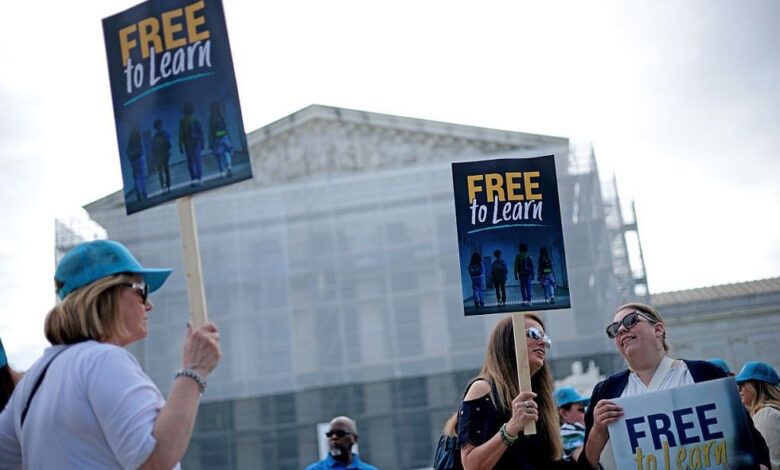This red state attorney general has declared war on the First Amendment

We thought the Supreme Court had finally purged anti-religious discrimination from Establishment Clause jurisprudence. After years of confusion — conflating the ban on state-sponsored religion with an invented mandate to scrub faith from public life — the Court, through a series of rulings on religious schools and public funding, had restored sanity. It returned the law to its pre-Warren era understanding: Equal treatment of religion does not violate the Constitution.
Yet, here we are again.
Those who claim that equal treatment of religion violates the Establishment Clause are the ones betraying its meaning.
In a move that stunned observers, Oklahoma’s own Republican Attorney General Gentner Drummond and the state supreme court now argue that states cannot recognize religious charter schools.
On Wednesday, the U.S. Supreme Court heard oral arguments in Oklahoma Statewide Charter School Board v. Drummond. The case centers on St. Isidore, a Catholic online school seeking to join Oklahoma’s charter school system. Drummond contends the school’s religious affiliation disqualifies it. He sued the state charter board — a move usually made by the ACLU or militant secularist groups.
The Oklahoma Supreme Court sided with him. The court claimed that granting charter status to a Catholic school would violate the First Amendment by effectively establishing Catholicism as a state religion. Justices labeled charter schools “state actors” and argued that any religious affiliation disqualifies a school from public recognition.
This logic turns the First Amendment on its head. The Constitution does not require hostility toward religion. It requires neutrality. Denying a religious school access to a public benefit — simply because it is religious — violates precedent.
Oklahoma’s Charter Schools Act permits any “private college or university, private person, or private organization” to apply for state funding to open a charter school. Excluding religious applicants contradicts not one but three major Supreme Court rulings.
In Trinity Lutheran Church of Columbia Inc v. Comer (2017), the court ruled that excluding a religious school from a public benefit for which it is otherwise qualified “solely because it is a church” is “odious to our Constitution.” That case involved a grant for playground resurfacing. If states can’t deny rubber mulch, they can’t deny full charter status.
In Espinoza v. Montana Department of Revenue (2020), a 5-4 majority held that state constitutions barring aid to religious institutions over secular ones violates the Free Exercise Clause. Public benefits, the Chief Justice John Roberts emphasized, cannot be denied “solely because of the religious character of the schools.”
Then came Carson v. Makin (2022), where Maine tried to distinguish between religious status and religious use, barring religious schools from voucher funds. The court rejected the distinction. Roberts, writing again for the majority, ruled that the program “operates to identify and exclude otherwise eligible schools on the basis of their religious exercise.” He warned that attempts to judge how a religious school carries out its mission invite unconstitutional state entanglement.
So how, after such ironclad precedent, do we find a Republican state attorney general and a court in a state Trump carried in every county ruling that religious schools can’t even apply for public funding?
The answer lies in years of lukewarm Republican control. These are Republicans in name only, who blocked judicial reform and refused to challenge activist courts. Now, Drummond wants a promotion. He’s announced his run for governor after already overruling the state education superintendent’s decision to ban pornography in public libraries.
This case reveals a larger pattern. Courts act as a one-way ratchet. Even after strong Supreme Court rulings, liberal lower courts defy precedent. They delay, split hairs, and distinguish without merit. The high court may reverse Oklahoma, but its rulings rarely secure lasting victories.
And the irony? Those who claim that equal treatment of religion violates the Establishment Clause are the ones betraying its meaning.
During the House debate on the First Amendment in 1789, James Madison explained: “Congress should not establish a religion, and enforce the legal observation of it by law, nor compel men to worship God in any manner contrary to their conscience.”
That principle — freedom of conscience without coercion — shaped the American experiment. Far from excluding religion, the founders assumed its influence. As Alexis de Tocqueville wrote, “The Americans combine the notions of religion and liberty so intimately in their minds, that it is impossible to make them conceive of one without the other.” He added that politics and religion formed an “alliance which has never been dissolved.”
It’s time for the Supreme Court to reaffirm that alliance — clearly, decisively, and without leaving room for lower courts to ignore. And in Oklahoma, it’s time to elect Republicans who still believe the Bible belongs in the Bible Belt.




